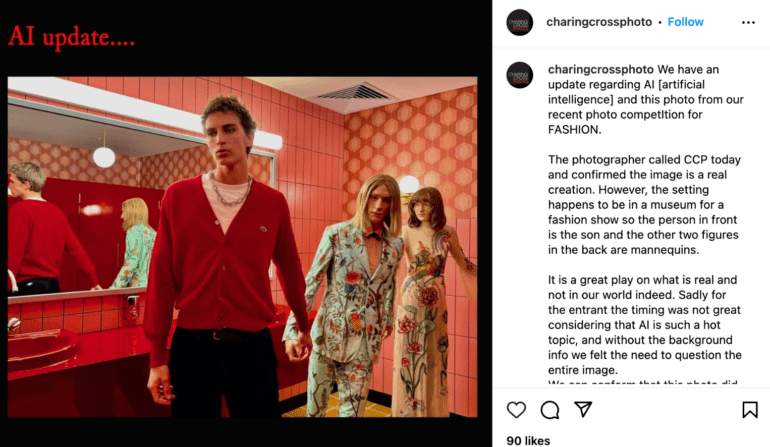TL;DR:
- A photograph submitted to a local fashion photography contest has been disqualified due to suspicions of AI involvement.
- The image captured the photographer’s son posing with mannequins at a Gucci exhibition.
- The contest, organized by Charing Cross Photo (CCP) in Sydney, offered a $500 prize.
- CCP’s owner reviewed the image’s metadata but couldn’t determine if AI was used.
- The photographer denied using AI and emphasized her unfamiliarity with the technology.
- The exhibition, titled “Gucci Garden Archetypes,” traveled from Florence to the Powerhouse Museum.
- CCP confirmed the authenticity of the image and acknowledged their mistake in disqualifying it.
- The competition aimed to showcase images from real-life experiences and spark a discussion about AI.
- Disputes regarding the authenticity of AI-generated images are ongoing in various fields of art.
- The incident highlights the need for transparency and open dialogue in the creative community.
Main AI News:
In a surprising turn of events, a photograph submitted to a local fashion photography competition has been disqualified amid suspicions of artificial intelligence (AI) involvement. The image, capturing the photographer’s son alongside two floral-dressed mannequins in a vibrant red bathroom at a Gucci exhibition, raised eyebrows and questions regarding its authenticity. The contest, organized by Charing Cross Photo (CCP), a renowned retail store based in Sydney, Australia, promised a modest $500 prize to the winner.
Last week, CCP made the decision to disqualify the photograph submitted by Suzi Dougherty, an Australian actor and amateur photographer. The Guardian recently reported that the owner of CCP, Ian Anderson, diligently reviewed the image’s metadata but was unable to conclusively determine whether AI had been utilized in its creation.
Dougherty, in defense of her work, claimed to have captured the image using only her iPhone. She vehemently denied any involvement of AI, stating, “I wouldn’t even know how to create an AI-generated photo. I’m still grappling with the intricacies of ChatGPT.”
The exhibition in question, titled “Gucci Garden Archetypes,” is a captivating immersive showcase presented by the esteemed Italian luxury brand to commemorate its centenary. Initially unveiled in Florence in May 2021, the exhibition later made its way to the Powerhouse Museum in November 2022, captivating visitors with its mesmerizing displays.
In a recent Instagram post, Charing Cross Photo publicly acknowledged the authenticity of the photograph and admitted their error. After Dougherty provided clarification on the image’s production process and confirmed the identity of the individual in the photograph as her son, CCP rectified its mistake.
In a previous statement, CCP had highlighted the competition’s aim to celebrate images depicting “real-life experiences.” The retail store further elaborated, stating, “It is a thought-provoking exploration of what is genuine and illusory in our world. Unfortunately, given the prominence of AI in current discussions, we felt compelled to question the integrity of the entire image without the necessary background information.” CCP expressed gratitude towards Dougherty for bringing clarity to the situation, despite ultimately missing out on the prize, and for sparking a meaningful conversation about AI.
The authenticity of AI-generated images continues to spark controversy across various domains. Some artists argue that such creations breach established legal standards pertaining to copyright. In April, German artist Boris Eldagsen voluntarily forfeited a prestigious Sony award presented by the World Photography Organization after doubts were raised by the judges regarding an image he had produced using artificial intelligence. Titled “The Electrician,” the image emulates a vintage photograph portraying two women adorned in midcentury attire. The photography organization lamented the breakdown in dialogue with Eldagsen surrounding his methodology and the transparency of AI utilization, acknowledging the failed attempts to foster constructive engagement.
Conclusion:
The disqualification of an AI-generated image from a fashion photography contest raises important questions about the role of artificial intelligence in the market. As disputes continue to arise regarding the authenticity and copyright implications of AI-generated art, it is crucial for businesses and artists to foster transparency and engage in meaningful dialogue. This incident serves as a reminder of the evolving boundaries and implications of AI technology in the creative industry, prompting a deeper examination of its impact on artistic expression and market dynamics.

